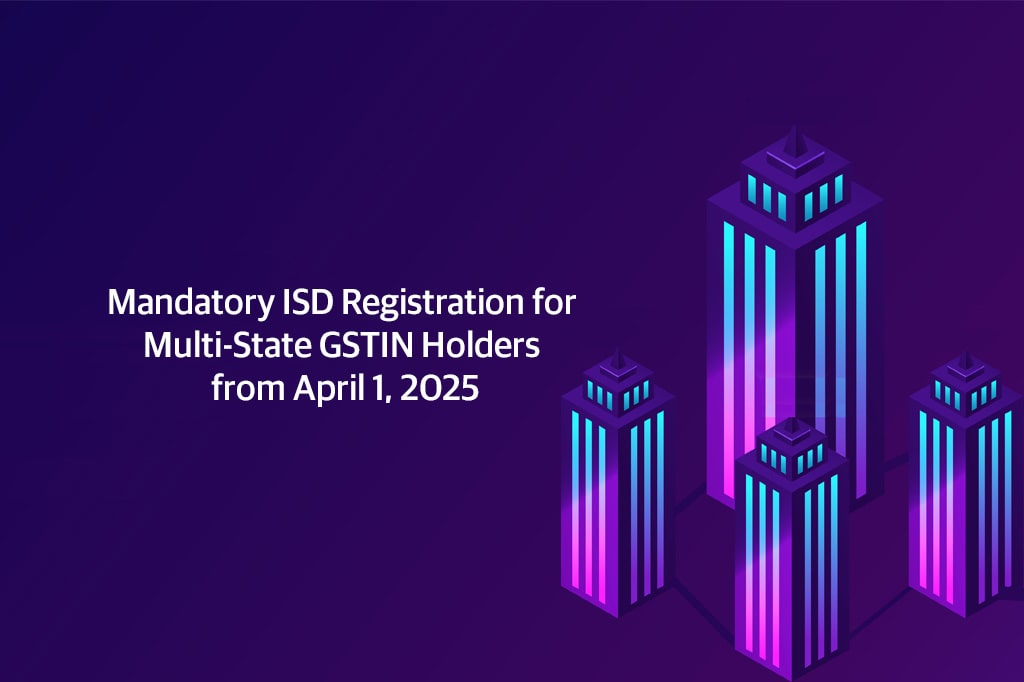The Goods and Services Tax (GST) system in India is undergoing a crucial change from April 1, 2025. Businesses operating in multiple states under the same Permanent Account Number (PAN) must now register as Input Service Distributors (ISD) to streamline Input Tax Credit (ITC) distribution. This reform aims to prevent ITC accumulation in a single location and ensure equitable tax allocation across states.
This article provides an in-depth analysis of the new rule, its implications, the process for ISD registration, and how businesses can stay compliant to avoid penalties.
Understanding the ISD Mechanism
The Input Service Distributor (ISD) system under GST enables businesses to distribute tax credits related to input services across their various branches. Typically, a company’s head office or any central unit that receives invoices for shared services (e.g., marketing, consultancy, security) can allocate the ITC to different locations where these services are actually consumed.
Why is ISD Registration Important?
- Ensures fair ITC distribution to all business locations.
- Helps avoid disputes over ITC claims across states.
- Prevents the buildup of excess credit in a single location.
- Ensures compliance with GST rules and audit processes.
Who Must Register as an ISD?
Businesses must mandatorily register as an ISD if they meet the following criteria:
- They have multiple GST registrations under a single PAN.
- The head office or central office receives invoices for input services consumed across different branches.
- The company wishes to distribute ITC among branches to avoid accumulation.
Even if a company was not using the ISD mechanism earlier, it must register before April 1, 2025, to comply with the new rule.
Key Provisions of the New Rule
1. Mandatory ISD Registration
- Businesses with multiple GST registrations under the same PAN must obtain ISD registration for the central entity that will distribute ITC.
- The ISD must be a separate GSTIN within the same PAN.
2. Monthly ITC Distribution & Compliance
- The ISD must distribute ITC every month through Form GSTR-6.
- Filing of GSTR-6 must be completed by the 13th of the next month.
- ITC must be allocated based on turnover proportions of the recipient branches.
3. Proportional ITC Allocation
- If a service is used by multiple locations, ITC must be distributed proportionally based on the turnover of each location in the previous financial year.
- This ensures accurate tax allocation and prevents incorrect claims.
4. Invoicing Rules for ISD
- The ISD must issue an invoice when distributing ITC.
- The invoice must follow Rule 54(1) of CGST Rules, 2017.
- A separate ISD invoice series must be maintained.
5. ITC Utilization by Recipient Branches
- The ITC received by a branch can be used only for GST liability in that state.
- Excess ITC cannot be reallocated back to the ISD.
Example: How the ISD Rule Applies to Businesses
Consider Accovet Ltd., a company with its head office in Kerala and branches in Tamil Nadu and Karnataka. The Kerala head office receives a consultancy service invoice for business strategy applicable to all locations.
Before April 1, 2025:
- The Kerala office might have claimed full ITC, leading to accumulated credit.
After April 1, 2025:
- Accovet Ltd. must register the Kerala head office as an ISD.
- It will distribute ITC to the Tamil Nadu and Karnataka branches based on their turnover ratio.
- Each branch will claim ITC proportionally, ensuring compliance and fair credit allocation.
What Happens If a Business Does Not Register?
Failure to comply with the ISD registration requirement can lead to:
- Denial of ITC for the recipient branches.
- Recovery proceedings by tax authorities for incorrect ITC allocation.
- Penalties, which may be the higher of ₹10,000 or the irregularly distributed ITC.
- Increased audit scrutiny and risk of legal complications.
Frequently Asked Questions (FAQs)
1. Who needs to obtain ISD registration?
Any business with multiple GST registrations under a single PAN that receives input service invoices at a central location must register as an ISD.
2. Can a business have multiple ISD registrations?
Yes. A company can have different ISD registrations for different divisions, such as marketing, security, and finance.
3. How is ITC distributed under ISD?
ITC is allocated based on turnover of the recipient branches from the previous financial year.
4. What is the due date for ISD return filing?
The ISD must file Form GSTR-6 by the 13th of every month.
5. Can an ISD distribute ITC to unregistered branches?
Yes, ITC can be distributed to unregistered locations if they consume input services.
6. What are the penalties for incorrect ITC distribution?
Incorrect ITC distribution can lead to ITC denial, tax recovery with interest, and a penalty of ₹10,000 or the wrongly distributed ITC amount, whichever is higher.
7. Can ITC be reallocated if a mistake occurs?
No, once ITC is distributed, it cannot be reallocated back to the ISD.
8. Will all businesses need ISD registration in every state?
No, ISD registration is only required at the central location where invoices for input services are received.
9. What is the benefit of ISD registration?
It ensures fair tax credit distribution, prevents accumulation of ITC, and improves compliance with GST regulations.
10. What should businesses do to prepare?
- Assess ITC utilization across branches.
- Identify a central ISD location.
- Register as ISD before April 1, 2025.
- Ensure invoicing and GSTR-6 compliance.
Experienced Business Consultant with a demonstrated history of working in the accounting industry. Skilled in Tax Preparation, Business Planning, Internal Audit, Account Reconciliation, and Accounting. Strong consulting professional with qualifications from ICAI & ICSI





